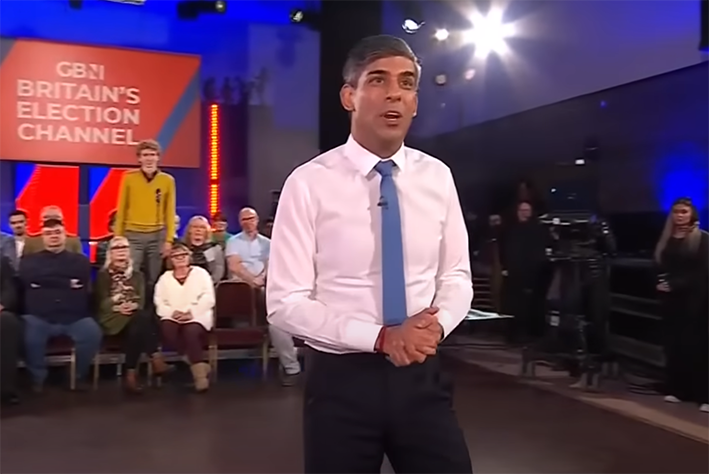GB News investigation has put Ofcom under the spotlight

Opinion
The industry will be closely watching how Ofcom rules on GB News’ People’s Forum: The Prime Minister.
When staff at media regulator Ofcom sit down to decide whether GB News has breached broadcasting impartiality rules with its programme on prime minister Rishi Sunak being questioned by 100 voters in Durham, what will they see?
Ofcom will soon notice that something that looks superficially like a normal current affairs programme was nothing of the sort.
It was an extremely boring programme that only rarely burst into life and appeared to change the minds of very few of the audience.
Stock answers, a sea of platitudes and questionable claims are of course more a matter for GB News than a broadcasting regulator.
So what might attract the attention of a regulator looking to see whether broadcasting rules had been broken?
No challenge
They would look at the role of the host, Stephen Dixon, whose performance consisted of smiling and saying: “Thank you very much, prime minister.” There was only one exception when Dixon intervened rather sheepishly to ask how the prime minister was going to get the Rwanda legislation through parliament.
Other than that limp effort, nothing the prime minister said was ever challenged, nor was he interrupted once.
The tone was set by Sunak’s introduction, when he was given time for a series of free hits, including his take on the five pledges — now downgraded to “priorities” — he made to the British people. They were to halve inflation, grow the economy, reduce debt, cut NHS waiting lists and stop the boats.
Audience members were not allowed to ask follow-up questions and neither were they asked whether they were satisfied with the answers they had received, as would happen in even the softest edition of Question Time.
GB News said it did not know the subject of the questions in advance and neither did Sunak. This must indeed be true because, bizarrely, none of the questions mentioned the economy, the cost-of-living crisis, the highest rates of taxation for generations or the impact of Brexit.
Campaigning video?
The point for Ofcom will not just be that nothing that Sunak said was challenged, however outrageous or unadjacent to the truth, but that there was no mechanism within the programme where anything could be challenged or corrected.
No attempt was missed, however inaccurate, to attack Labour leader Sir Keir Starmer and his policies. Once again, there was no challenge, nor the possibility of challenge.
The final question for Ofcom must surely be whether there was enough difference between the GB News programme and anything that could have been produced by Conservative central office as a campaigning video or party political broadcast.
The answer is clearly no.
Missed opportunity
There was one opportunity to redress the overall imbalance — a panel chaired by Patrick Christy that followed Sunak’s show.
Alas, the opportunity was spurned. There was a backbench Labour MP, but the panel was dominated by James Daly, deputy chairman of the Conservative party; minister for common sense Esther McVey; and right-wing Express commentator Carole Malone.
The only real political diversity came from even further right, with the inclusion of Reform party leader Richard Tice.
Previous breaches
When they sit down to review the GB News special, Ofcom staff will follow the evidence of their eyes and broadcast regulation.
It is difficult to see them coming to any other conclusion other than that, yet again, GB News has breached the broadcasting rules enshrined in its licence. The broadcaster has already been found to have broken Ofcom rules five times, with no less than 12 other investigations still open.
The Sunak programme could turn out to be the most high-profile breach of rules so far.
Given that this is an election year, what is to be done about the increasing problem of GB News? By the time Ofcom rules on the Sunak show, GB News runs the risk of being found guilty of further breaches from the 12 investigations already under way.
Does the broadcaster, which made a loss of £30.7m in the year to May 2022, not understand the rules?
That seems unlikely, because the organisation employs a specialist in broadcast regulation to advise on how to do opinionated, right-wing programming within the rules of due impartiality.
If GB News is found to have broken broadcast rules with People’s Forum: The Prime Minister, it really will be time for Ofcom to send a message that not even GB News can ignore.
It would be too extreme for GB News to lose its licence, but for any broadcaster that has breached Ofcom’s rules so many times, surely a significant fine — that could run into the millions — and warnings about future behaviour for repeated breaches could be forthcoming?
The credibility of Ofcom itself, not just that of GB News, is at stake.
 Raymond Snoddy is a media consultant, national newspaper columnist and former presenter of NewsWatch on BBC News. He writes for The Media Leader on Wednesdays — read his column here.
Raymond Snoddy is a media consultant, national newspaper columnist and former presenter of NewsWatch on BBC News. He writes for The Media Leader on Wednesdays — read his column here.




